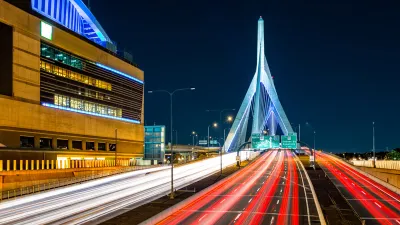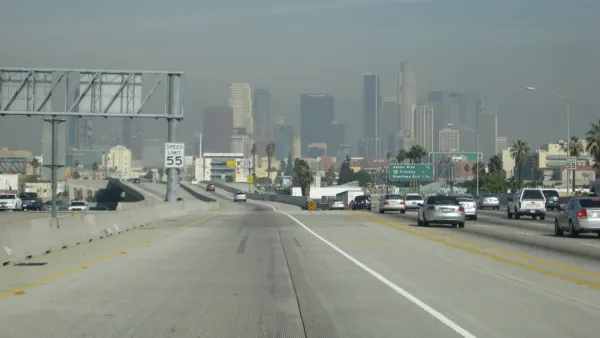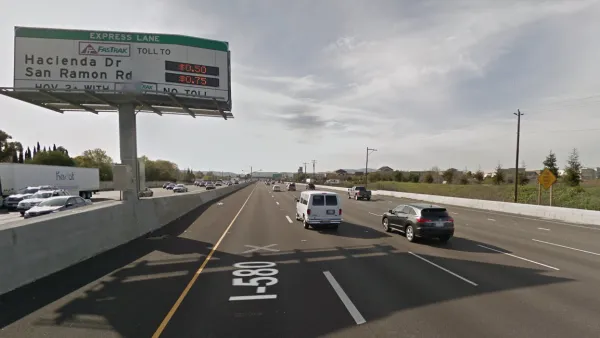A year ago Massachussetts looked like it could be one of the next states to adopt a vehicle mileage fee program. Not likely under this governor. Baker opposes an amendment that allows the state to apply for federal grant funding to study VMT fees.

Planetizen reported just over a year ago that Massachusetts could be among the next states to adopt a vehicle miles traveled (VMT) fee. State Sen. Jason Lewis, D-Winchester, had sponsored S.1851: "An Act to explore alternative funding sources to ensure safe and reliable transportation."
"As we add more fuel-efficient vehicles to the roads, the gas tax is going to be declining, and that will exacerbate our revenue shortfalls," said Lewis. "We need to come up with a more reliable funding source."
Lewis had it right. Fuel-efficiency in vehicles continues to increase, notwithstanding the lowest gas prices since 2004 and a surge in SUV purchases.
The result: gas tax revenues, the main source of state funding for transportation projects, particularly road and bridge maintenance, are not keeping pace with demand.
S.1851 stalled last year in the state legislature according to its legislative history.
On July 23, mileage fee advocates added a provision to a to an "otherwise uncontroversial road and bridge bond bill" that would allow Massachusetts to "apply for federal funding to test whether to implement a tax on vehicle miles traveled," reported Shira Schoenberg for The Republican/ MassLive.com on July 28.
The idea is to look to the future to figure out a more stable way of collecting revenue for transportation infrastructure," said state Rep. Tricia Farley-Bouvier, D-Pittsfield, one of the major proponents of the pilot program.
Readers may recall that in June the Connecticut DOT joined four other Northeastern states in the "I-95 Corridor Coalition" in applying for $2.1 million of the $15 million in federal funding available for states to implement pilot projects to showcase "user-based alternative revenue mechanisms."
However, Gov. Charlie Baker was none to pleased with that provision.
"Baker, a Republican, also criticized the Democratic-controlled Legislature for making the proposal with only days left before the end of the legislative session," reported Schoenberg on July 29. The legislative season ended on July 30.
"It's really an opportunity to look at it as an option for getting revenue separate from the gas tax," said State Sen. Thomas McGee, D-Lynn, Senate chairman of the Transportation Committee.
McGee stressed that this would be a revenue-neutral test program, conducted exclusively with volunteers. "It's an opportunity for us to create a volunteer pilot program and see if it would work, see if people would take a look at that as an option," McGee said.
The pilot program McGee describes is what began last month in California, and the ongoing program that began a year ago in Oregon, with the notable exception that it would be one tenth the size, allowing only 500 volunteers to participate.
Chip Faulkner, a spokesman for the anti-tax advocacy group Citizens for Limited Taxation, pointed out that voters in 2014 just rejected automatic indexing of the state's gas tax to inflation. He said his group would actively oppose this effort as well. "We're one of the most heavily taxed states in the country," Faulkner said. "On top of that, we rejected the gas tax. This is just insulting."
Faulkner is some ways makes the case for the VMT fee. With many state legislatures and governors either unwilling or unable to increase gas taxes, and as shown in the Bay State, even unable to index the gas tax to inflation, many in the transportation community have looked for alternatives to the gas tax.
The pilot program has the support of environmental groups and transportation advocates.
"Because the bill is a spending bill, Baker has line item veto power," adds Schoenberg. As of press time, Baker had not acted on it yet, emailed Schoenberg on August 2. Here's her latest update.
FULL STORY: Gov. Charlie Baker opposes vehicle miles traveled tax proposal

National Parks Layoffs Will Cause Communities to Lose Billions
Thousands of essential park workers were laid off this week, just before the busy spring break season.

Retro-silient?: America’s First “Eco-burb,” The Woodlands Turns 50
A master-planned community north of Houston offers lessons on green infrastructure and resilient design, but falls short of its founder’s lofty affordability and walkability goals.

Delivering for America Plan Will Downgrade Mail Service in at Least 49.5 Percent of Zip Codes
Republican and Democrat lawmakers criticize the plan for its disproportionate negative impact on rural communities.

Test News Post 1
This is a summary

Test News Headline 46
Test for the image on the front page.

Balancing Bombs and Butterflies: How the National Guard Protects a Rare Species
The National Guard at Fort Indiantown Gap uses GIS technology and land management strategies to balance military training with conservation efforts, ensuring the survival of the rare eastern regal fritillary butterfly.
Urban Design for Planners 1: Software Tools
This six-course series explores essential urban design concepts using open source software and equips planners with the tools they need to participate fully in the urban design process.
Planning for Universal Design
Learn the tools for implementing Universal Design in planning regulations.
EMC Planning Group, Inc.
Planetizen
Planetizen
Mpact (formerly Rail~Volution)
Great Falls Development Authority, Inc.
HUDs Office of Policy Development and Research
NYU Wagner Graduate School of Public Service





























